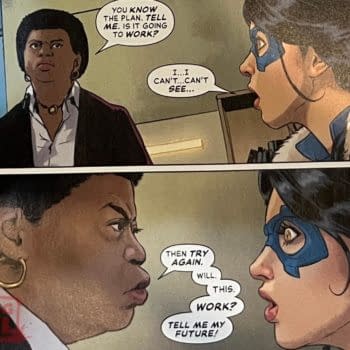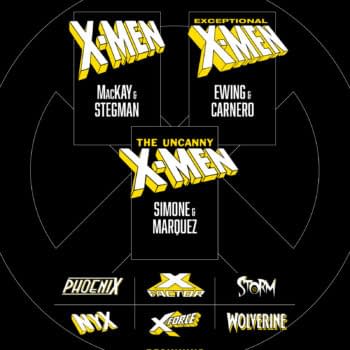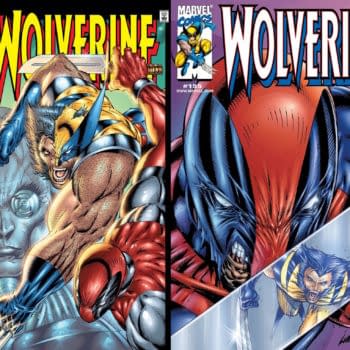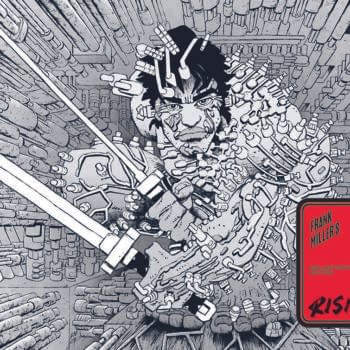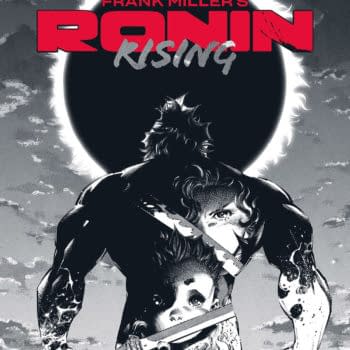Posted in: Recent Updates | Tagged: bbc, doctor who
The Many Worlds Of Alasdair Stuart – A Very English Armageddon #2 – Russell T Davies' Dark Season

My love for all things ruck and sack related and my pathological love of paddles comes from one single thing, a televisual gem that ran for six weeks in the early '90s then completely disappeared; Dark Season, written by Russell T Davies. Years before his work on Doctor Who, or even Queer as Folk, Davies quietly turned in two of the oddest bits of children's TV in decades, one of which was Dark Season, a series which hit me square between the eyes in much the same spot as The Day The Earth Caught Fire. There's the same sense of impending doom, the same gallows humour and the same grounded, pragmatic approach to the impossible all of which is married to arguably Davies' greatest strength as a writer; maniacal pulp glee.
The series follows Marcie and her two friends, Tom and Reet as they make their way through the uniquely universal crucible of school. Marcie is small, wise beyond her years, erratic and brilliant, Tom is cleverer than he wants to admit and Reet, for all her mild concern over hanging out with the substantially younger Marcie, is quietly relieved that there's at least one other person in the world who's clever. None of them are quite right, none of them are perfect and they don't always get on but they hold each other up, each relying on the others with that unique combination of intimicacy and necessity that binds you to people at that age. Marcie keeps Reet and Tom's eyes and minds open whilst Reet and Tom keep Marcie connected to the world, keep her grounded. Adolescence isn't something you experience, it's something you survive and Marcie, Reet and Tom are the living proof.
A genius who can't understand why the world doesn't work as fast as she does. A skater with a carefully maintained mask of ignorance. A girl with people hair who wants people to see more that that and dispairs that no one does. These three, and the way they interact with one another, provide a rock-solid foundation for Davies to build the series around and in doing so, to take it to places that are anything but normal. Because make no mistake, Davies has rarely been more gleefully pulpy than he is here.
The series is divided into two three part stories, the first of which concerns Eldritch Computing donating a computer to every child at their school. This apparent act of altruism isn't uncommon but the manner in which it's presented clearly is. Mr Eldritch is a spectacularly obvious VILLAIN, complete with black leather trenchcoat, cyberpunk shades and bleached blonde hair and his apparent desire to help the children masks a particularly unpleasant ulterior motive. The children aren't just the future here, they're the workforce and at first Reet and Tom can't see that.
Marcie, of course, can and the script neatly counter-balances her intelligence and caution with the enthusiasm and youth of the other characters. It neatly emphasises the fact that there's something a little odd about Marcie too, a quick-witted, endlessly observant figure who always carries around a rucksack full of potentially useful items, including a paddle. This becomes a running gag throughout the series until Reet finally asks why she always carries it and Marcie responds with:
Because you never know when you're going to be up the creek
As well as proving why having a paddle is a good plan, this line says an awful lot about Marcie. She's a figure who revels in her isolation for what it gives her, just as she rails against it for keeping her away from the world. Marcie is endlessly intelligent, relentlessly determined, a woman who is able to see a world of chilling possibilities in nothing more than an empty yogurt pot on the street. She's endlessly prepared, endlessly ready and endlessly concerned, standing on the barricades and facing down the things humanity never even realises are waiting for us. She's right, very nearly all the time, but all that does is push her further away from everyone else. She's the Doctor in miniature, a figure as attracted by humanity as she's repulsed and it's fascinating to see Davies play with ideas like this, years before they'd come to fruition in Midnight.
In fact, there's a clear line that can be drawn between Midnight and Dark Season. Both deal with the lone defender on the edge of understanding, both explore the world beyond what we know and both, crucially, never give you a clear answer about what's going on. The creature in Midnight is an idea that steals vocal chords, whilst the villain in the first Dark Season story wears the skin of a goth Bill Gates but may be something far, far older. We get just enough education to perform, just enough information to understand. We go to the edge but we can't look over it because what we'd see would drive us mad. That world, of abstracts with absolute power, filled with timeless creatures with motives we can't even begin to fathom isn't just classic Doctor Who, or Dark Season, it's classic HP Lovecraft. This is a story about the people who protect us from the monsters and the fact that, in this case, those protectors are children only raises the stakes.
This combination of fragility and strength, of pragmatism and exuberance really comes to the fore in the second story. The school is scarcely past the Eldritch Computing incident when a group of archaeologists arrive and ask to begin digging under the playing field. Like the previous story, this is an uncommon but not rare occurrence and, like the previous story, the school adapts to it with the desperate enthusiasm of a group of teenagers faced with something new to play with, talk to or destroy. Not even the fact the archaeologists are suspiciously para-military, Aryan and have an unusually high number of German accents rings alarm bells. At least, not for anyone besides Marcie, Tom and Reet.
This second and final Dark Season story stands with some of Davies' best work simply because of the sheer volume of information crammed into it. As well as the first hints that one of the teachers at school is listening to Marcie, to say nothing of more development of Marcie, Tom and Reet, it features the archaeologists (Led by Jacqueline Pearce of Blake's 7), Mr Eldritch and the thing they're all fighting over: Goliath, a world war II era artificial intelligence.
By any weight and measure this story is pure lunacy but it really doesn't matter. Davies uses the collision between these demented pulp ideas and the staid, polite world of the English school system to create something which plays like a cross between Dick Barton, Indiana Jones, Grange Hill and Doctor Who. As the Goliath awakes and the three power groups struggle for dominance, you get the same sense of something vast moving on the edge of reality as the best Sylvester McCoy era TV stories or the best tie-in novels were able to convey. This is a game being played on multiple levels and the only one we can see, the only one we're allowed to see, is the one where an unusually smart school girl and her friends foil a group of Nazi archaeologists and something that looks like a man. It's an Armageddon just as personal as any of the dozens every teenager suffers and yet far, far larger, both a defining moment and a liberating one that's summed up, as it should be, by Marcie. Crouching on the edge of the crater where the Goliath once stood, just for a second we see the weight of the years, the crushing pressure of her intelligence and the obligation it puts her under. Then she turns, informs her friends that they're all fantastic and leads them off into the distance. Sometimes, just sometimes, saving the day is enough and Marcie is old enough and wise enough to realise that. Besides, she can always get another paddle.
Dark Season, like it's characters, occupies the space between two pivotal moments. Whilst it's characters are not children but not yet adults the series itself is a clear waypoint between Davies' dramatic work and his eventual work on Doctor Who. Marcie is even directly referenced in Davies' Doctor Who novel Damaged Goods and Dark Season is full of in-jokes that refer to the series or would be referred to by the series in it's later incarnation.
What really marks Dark Season out though is how much the series has in common with its protagonist. Both are outsiders, both are highly intelligent and both have a unique world view; keep your eyes open, trust the weird kid, make sure you know where your paddle is. As advice goes, that's pretty good don't you think?
Next time, we'll be putting Stargate: Universe on the slab for Five Act Autopsy. In the meantime, if you've got a suggestion, a question or want to mail me either 30 Rock on DVD or some biscuits, then get in touch at fiveactautopsy@googlemail.com
Alasdair Stuart






